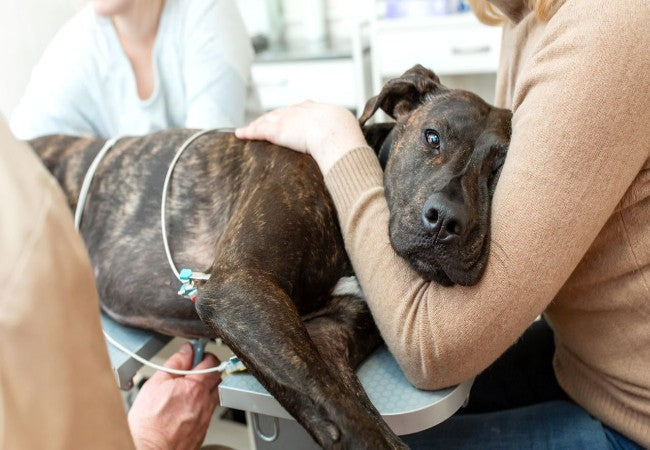Veterinary Guide to Canine Liver & Gallbladder Cancer 2025 🐶🎗️🩺

In this article
Veterinary Guide to Canine Liver & Gallbladder Cancer 2025 🩺🐶
By Dr. Duncan Houston BVSc
🧬 Understanding Liver & Gallbladder Cancers
Liver and gallbladder cancers in dogs are rare (<2% of cancers ), but serious. They may begin in the liver (primary hepatocellular carcinoma or bile duct carcinoma) or gallbladder, or metastasize from other cancers.
Types of Hepatobiliary Tumors
- Hepatocellular carcinoma (HCC) – most common; often massive (single large nodule), but can be nodular or diffuse.
- Bile duct carcinoma, the second most common primary liver cancer, may involve the gallbladder wall, cholangiocarcinoma.
- Gallbladder carcinoma – rare, often obstructs bile flow, and causes jaundice.
- Metastatic tumors – spread from other cancers, indicating advanced disease and poor prognosis.
👥 Who Is Affected?
- Primarily older dogs, sometimes middle-aged; breeds at higher risk include Goldens, German Shepherds, Poodles, Rottweilers.
- Gallbladder tumors typically occur in seniors and often involve bile duct obstruction.
⚠️ Clinical Signs to Watch For
Early stages may be asymptomatic. Signs often appear when the disease is advanced :
- Weight loss, decreased appetite, lethargy.
- Jaundice—yellowing of gums, eyes, and skin.
- Vomiting, diarrhea, abdominal pain/distension.
- Fever, coagulopathies, and ascites.
🔍 Diagnostic Approach
- Physical exam & labwork: CBC/chem may show elevated liver enzymes, low albumin, and bilirubin; clotting may be abnormal.
- Imaging: Ultrasound is key—identifies size, location, and number of nodules; CT/MRI helpful for surgical planning.
- Biopsy/FNA: Ultrasound-guided sampling confirms tumor type and malignancy.
- Thoracic & abdominal imaging: Rule out metastasis.
- Gallbladder-specific tests: Ultrasound or CT to detect mucoceles, stones, wall thickening, or masses.
🛠️ Treatment Options
1. Surgical Removal
- Lobectomy for singular/massive HCC offers an excellent prognosis, as the liver can regenerate.
- Cholecystectomy if gallbladder cancer or obstruction is present, often combined with hepatic resection.
- Massive or focal tumors are the best candidates; nodular/diffuse forms are less amenable to surgery.
2. Chemotherapy & Targeted Therapy
- Adjuvant chemo after incomplete excision or metastatic tumors.
- Metronomic chemo (low-dose daily) or targeted therapy (e.g., Palladia/toceranib) may be used.
- Stereotactic radiation is emerging for inoperable focal lesions.
3. Supportive Care
- SAMe and milk thistle (silybin) supplements aid liver support.
- Nutritional liver-friendly diets, antiemetics, coagulation support, and fluid therapy.
- Palliative care prioritizes comfort in late-stage or diffuse disease.
📈 Prognosis & Outcomes
- Massive HCC, surgically removed: dogs can live multiple years post-op due to liver regeneration.
- Nodular/diffuse: poor prognosis—hard to remove, average survival 3–6 months with supportive therapy.
- Gallbladder carcinoma: variable—depends on resectability; obstructive disease may shorten survival.
- Metastatic disease: advanced with poor outcomes despite therapy.
📱 Ask A Vet Telehealth Support
- 📸 Upload imaging (ultrasound/CT) and lab reports for specialist review.
- 🔔 Get reminders for pre-op testing, follow-up imaging, supplement schedules.
- 🩺 Video consults for post-op monitoring, wound checks, jaundice/ascites assessment.
- 💊 Purrz delivers meds—chemo, liver support, pain relief, anti-nausea drugs.
- 🧠 Woopf logs track appetite, weight, energy, side effects, and long-term recovery.
🎓 Case Spotlight: “Cooper” the Labrador
Cooper, a 10-year-old Lab, had lethargy, jaundice, and elevated liver enzymes. Ultrasound revealed a 5 cm mass in the right liver lobe; FNA confirmed HCC. Right lobectomy was performed. Supplements and a liver-friendly diet were started post-op. Ask A Vet coordinated histopath review, medication delivery, and monthly liver panels. Two years later, Cooper remains asymptomatic and active. 🐾
🔚 Key Takeaways
- Primary liver/gallbladder cancers are rare but serious; early detection is crucial.
- Start with bloodwork and imaging (ultrasound, CT); confirm with FNA or biopsy.
- Surgery is the best option for focal tumors, with excellent outcomes in massive HCC.
- Chemo, targeted therapy, and radiation help when surgery isn't possible.
- Supplements like SAMe and silybin aid liver recovery.
- Ask A Vet telehealth enhances care—providing diagnosis support, treatment coordination, and monitoring throughout recovery 📲🐾
Dr Duncan Houston BVSc, founder of Ask A Vet. Download the Ask A Vet app for telehealth guidance—from imaging review and surgical planning to remote monitoring, medication delivery, and long-term support after liver or gallbladder cancer diagnosis 🐶📲






